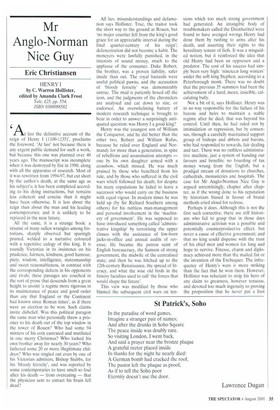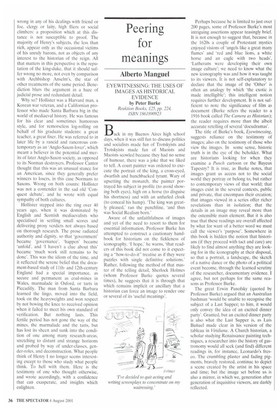Mr Anglo-Norman Nice Guy
Eric Christiansen
HENRY I by C. Warren Hollister, edited by Amanda Clark Frost Yale, .E25. pp. 554, ISBN 0300088582 A 1 last the definitive account of the reign of Henry I (1100-1135)', proclaims the foreword. 'At last' not because there is any urgent public demand for such a work, but because this one was planned over 40 years ago. The manuscript was incomplete when it was destroyed by fire in 1990, along with all the apparatus of research. Most of it was rewritten from 1994-97, but cut short by the author's death, at the same age as his subject's; it has been completed according to his dying instructions, but remains less coherent and concise than it might have been otherwise. It is less about the reign than about the man and his leading contemporaries; and it is unlikely to be replaced in the near future.
All the same, it is a strange book: a resume' of many sullen wrangles among historians, sharply observed but sparingly pruned, welded to a narrative coloured with a repetitive eulogy of this king. It is roundly Victorian in its insistence on his prudence, fairness, kindness, good humour, piety, wisdom, intelligence, statesmanship and sweet reasonableness, in contrast with the corresponding defects in his opponents and rivals; these passages are couched in the sort of prose that descends from a great height to anoint 'a regime more rigorous in its maintenance of peace and good order than any that England or the Continent had known since Roman times', as if there were an election to be won. Such claims invite disbelief. Was this political paragon the same man who personally threw a prisoner to his death out of the top window in the tower of Rouen? Who had some 94 minters of his coin castrated and mutilated in one merry Christmas? Who locked his own brother away for nearly 30 years? Who fathered some 20 or more illegitimate children? Who was singled out even by one of his Victorian admirers, Bishop Stubbs, for his 'bloody ferocity', and was reported by some contemporaries to have smelt so foul after his death — from overeating — that the physician sent to extract his brain fell dead?
All lies, misunderstandings and defamation says Hollister. True, the traitor took the short way to the ground at Rouen, but 'no major courtier fell from the king's good grace for an appreciable interval during the final quarter-century of his reign'; defenestration did not become a habit, The moneyers were lawfully punished, in the interests of sound money, much to the applause of the consumer. Duke Robert, the brother, was a proven liability, safer inside than out. The royal bastards were useful political pawns, and the accusation of 'bloody ferocity' was demonstrably untrue. The mud is patiently hosed off the icon, and the judgments of the chroniclers are analysed and cut down to size, or endorsed. An overwhelming battery of modern research technique is brought to bear in order to answer a surprisingly antiquated question: was Henry I a good king?
Henry was the youngest son of William the Conqueror, and he did better than the other two, Robert and William Rufus, because he ruled over England and Normandy for more than a generation, in spite of rebellions and assassination attempts — one by his own daughter armed with a crossbow, which missed. He was much praised by those who benefited from his rule, and by those who suffered in the civil wars which followed his death; for despite his many copulations he failed to leave a successor who would carry on the business with equal vigour. In modern times he was held up (by Sir Richard Southern among others) for his ruthless man-management and personal involvement in the 'machinery of government'. He was supposed to have introduced something called 'administrative kingship' by terrorising the upper classes with the assistance of low-born jacks-in-office and annual audits of revenue. He became the patron saint of English bureaucracy, the Samson of strong government, the midwife of the centralised state; and then he was hitched up to the 12th-century Renaissance, the spread of literacy, and what the wise old birds in the history faculties used to call 'the forces that would shape the future'.
This view was modified by those who blamed the subsequent civil wars on ten
sions which too much strong government had generated. An intangible body of troublemakers called the Disinherited were found to have avenged wrongs Henry had done them by rushing to arms after his death, and asserting their rights to the hereditary tenure of fiefs. It was a misguided notion, but it reinforced the idea that old Henry had been an oppressor and a predator. The cost of his success had simply been very high: 'nineteen long winters' under the soft king Stephen, according to a Peterborough monk. There was no doubt that the previous 35 summers had been the achievement of a hard, mean, irascible, calculating bully.
Not a bit of it, says Hollister. Henry was in no way responsible for the failure of his barons and heirs to maintain a stable regime after he died; that was beyond his control. Until then, he had ruled not by intimidation or repression, but by consensus, through a carefully maintained support group of bishops and abbots and barons, who had responded to rewards, fair dealing and tact. There was no ruthless administrative machine, just a system of handing out favours and benefits; no hoarding of tax money wrung from the English, but a prodigal stream of donations to churches, cathedrals, monasteries and hospitals. The case for Mr Anglo-Norman Nice Guy is argued unremittingly, chapter after chapter, as if the wrong done to his reputation by historians biased in favour of brutal methods cried aloud for redress.
Perhaps it does. Although this is not the first such corrective, there are still historians who fail to grasp that in those days administrative activism was a possible and potentially counterproductive effect, but never a cause of effective government; and that no king could dispense with the trust of his chief men and women for long and hope to survive. Finesse, charm and diplomacy achieved more than the mailed fist or the invention of the Exchequer. The infrequency of Henry's wars is more striking than the fact that he won them. However, Hollister was reluctant to strip his hero of any claim to greatness, however tenuous, and devoted too much ingenuity to proving the proposition that he never put a foot wrong in any of his dealings with friend or foe, clergy or laity, high fliers or social climbers: a proposition which at this distance is not susceptible to proof. The majority of Henry's subjects, the less than rich, appear only as the occasional victims of his unruly barons, not as objects of any interest to the historian of the reign. All that matters in this perspective is the reputation of the king-duke, that it should suffer wrong no more, not even by comparison with Archbishop Anselm's, the star of other treatments of the same period. Benediction blurs the argument in a haze of judicial prose and redundant detail.
Why so? Hollister was a Harvard man, a Korean war veteran, and a Californian professor who made Santa Barbara big in the world of mediaeval history. He was famous for his clear and sometimes humorous style, and for remorseless log-rolling on behalf of his graduate students: a great teacher, a great fixer. He was referred to in later life by a rancid and rancorous contemporary as an 'Anglo-Saxon-lover', which meant a believer in the potential and merits of later Anglo-Saxon society, as opposed to its Norman destroyers. Professor Cantor thought that this was an unusual stance for an American, since they generally prefer winners to losers, in this case Normans to Saxons. Wrong on both counts: Hollister was not a contender in the sad old 'Conquest debate', and he wrote with equal sympathy of both cultures.
Hollister stepped into the ring over 40 years ago, when it was dominated by English and Scottish mediaevalists who specialised in settling small scores and delivering prosy verdicts not always based on thorough research. The prose radiated authority and dignity, so that 'government' became 'governance', 'happen' became 'unfold', and 'I haven't a clue about this' became 'much work still remains to be done'. This was the idiom of the time, and it reflected the serene belief that the document-based study of 11thand 12th-century England had a special importance, as secure and permanent as coal-mines in Wales, marmalade in Oxford, or tarts in Piccadilly. The man from Santa Barbara learned the lingo, moved into the field, took on the heavyweights and won respect by not bowing the knee to received opinion when it failed to meet his own standard of verification. But nothing lasts. This fertile period has not gone the way of the mines, the marmalade and the tarts, but has lost its sheen and sunk into the condition of one among many research-areas, stretching to distant and strange horizons and probed by way of under-classes, gender-roles, and deconstruction. What people think of Henry I no longer seems interesting except to those who study what people think, To hell with them. Here is the testimony of one who thought otherwise, and wrote accordingly, with a confidence that can exasperate, and insights which enlighten.



























































 Previous page
Previous page